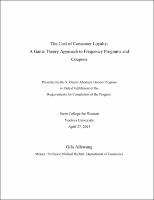Please use this identifier to cite or link to this item:
https://hdl.handle.net/20.500.12202/4084| Title: | The Cost of Consumer Loyalty: A Game Theory Approach to Frequency Programs and Coupons |
| Authors: | Allswang, Gila |
| Keywords: | Consumer behavior --United States --Mathematical models. Consumers --United States --Attitudes --Mathematical models. Market surveys --United States --Mathematical models. Customer loyalty programs --United States --Mathematical models. Coupons (Retail trade) --United States --Mathematical models. Retail trade --United States --Mathematical models. Game theory. Rebates. |
| Issue Date: | Apr-2015 |
| Publisher: | Stern College for Women |
| Abstract: | In this paper, we view the profitability of implementing consumer frequency programs through a game theory lens. Our model takes into account consumers with differing values, both for the good being sold and for their time. These customers have the option of seeking out and utilizing coupons, frequency programs, or both in order to save money on the good. However, both of these programs require time, so not all consumers will be willing to take advantage of them. The models conclude that a rational firm will make the decision to implement these programs based on the composition of their target population. Frequency programs and coupons can both be effective profit maximizing strategies for the firm. They are most effective when catered to their specific consumer population, as is depicted in the three models. |
| Description: | The file is restricted for YU community access only. |
| URI: | https://hdl.handle.net/20.500.12202/4084 https://ezproxy.yu.edu/login?url=https://repository.yu.edu/handle/20.500.12202/4084 |
| Appears in Collections: | S. Daniel Abraham Honors Student Theses |
Files in This Item:
| File | Description | Size | Format | |
|---|---|---|---|---|
| Gila-Allswang.pdf Restricted Access | 219.1 kB | Adobe PDF |  View/Open |
This item is licensed under a Creative Commons License

